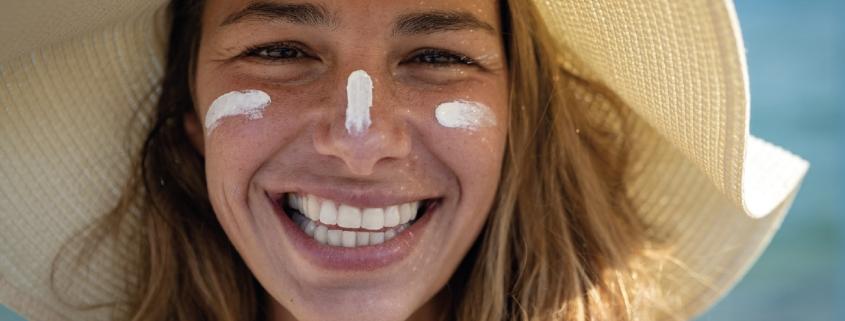Are you sunscreen savvy?
Every year I write a little reminder in my editorial about of the dangers of over exposure to the sun’s rays. I am still amazed that a large number of our population think that the sun in this country is less damaging than when they are in warmer climates on holiday. You only have to experience sunburn on snow ski-ing holidays! And after all, it is the same sun whichever country you are in.
There is no doubt that over exposure to the sun is a huge contributor to the premature ageing of the skin. This includes deep lines and wrinkles, toughened leathery looking skin, broken capillaries and brown pigmentation marks. When I went to live in Australia in my 20s and worked for a skin care company I was made aware very quickly that people in their 20s were already showing signs of premature ageing and that by the time they were aged 40 looked 60. Incidences of skin cancer were high, but people still carried on baking themselves. Thankfully Australians have a very different outlook now and are super careful.
Certain medications cause the skin to be sun sensitive and could result in severe burning. Tetracycline antibiotics are often prescribed to acne sufferers to kill the bacteria associated with acne. These antibiotics are among a group that can trigger sun sensitivity to the skin. Certain antidepressants can also come into this category. The natural antidepressant St. John’s Wort is another example. Roaccutane is popular for the treatment of acne.
As it thins the skin over the whole body a high SPF must be applied to any areas that are to be exposed to the sun at all times, not just when sunbathing. The high SPF should be continued for at least 6 months after the treatment has ceased. It is probably advisable to check on the internet or with your pharmacist whether your medication can make your skin sensitive to the sun.
As a nation our levels of Vitamin D are very low. Vitamin D is manufactured by our exposure to the sun. 20 minutes of sun exposure to a small area of the surface of the skin is sufficient to boost our Vitamin D levels. The good news is that sunscreen does not block out our ability to manufacture the vitamin D. Studies have never found that everyday sunscreen use leads to Vitamin D insufficiency. In fact people who use sunscreen daily can maintain their vitamin D levels.
Sunscreens have come a long way from the thick, sticky, white stuff I remember from my youth. There are spray on versions which are great for the children. It is always better to apply the sunscreen about 20 minutes before venturing out into the sun. In the summer when the sun is highest in the sky remember to wear a hat or cap to protect your head and face.
Prevention is always better than cure. However, at Hough Green Clinic we have numerous treatments for prolonged sun damage and ageing skin. Our prescriptive facials and peels, The BYONIK to tackle pigmentation, lack of collagen and elastin, Laser treatment for pigmentation and thread veins. We also sell a wide range of sunscreens for face and body. We are always here to help you love the way you look, no matter what age you are.



